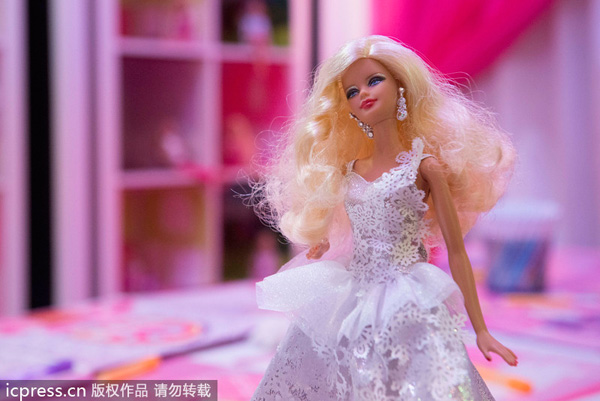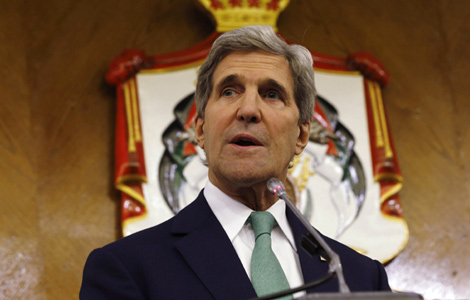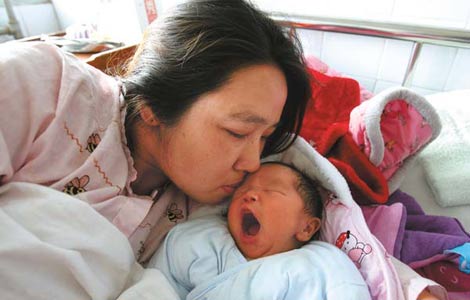China sales aren't all fun, games to Mattel
Updated: 2013-11-08 11:05
By Wang Wen (China Daily)
|
||||||||
|
 |
|
Barbie Factory moved in ephemeral space from October 19th to 28th 2013 in Saint Germain des Pres in Paris, France, Oct 18, 2013.[Photo/icpress.cn] |
Unlike Western customers, Chinese children and their parents are not familiar with cartoons or stories related to foreign toy companies' products.
Parents usually do not buy the toys if they cannot tell the related stories clearly to their children, Zhang said.
"The foreign manufacturers need to make every effort to promote their toys to the Chinese," she said.
On the other side, price is another barrier for foreign toymakers in China, Zhang said.
"Chinese customers are price-sensitive to toys, which are not a daily necessity," Zhang said. "And foreign companies' products are not affordable for every Chinese parent."
Chinese parents have cheaper choices provided by domestic toy manufacturers, she added.
But Broegger sees an opportunity because the amount the Chinese spend on toys is much lower than the global average level.
The spending on toys for children is increasing in China, he said, creating potential customers for his company.
China is more important for Mattel as its manufacturing base, rather than as a market. The toymaker built its first factory in China in 1984, almost 15 years before it started to sell its products in China.
Mattel has six factories in China. About 50 percent of its global products are made by these factories.
But as with the entire manufacturing industry, the toy manufacturer needs to face the rising costs of labor and various materials in China.
The average salary of an employee in toys and games manufacturing in China increased by 47 percent from 2007 to 2012, according to Euromonitor International, a London-based market research firm.
Some other countries, such as Brazil and India, are options to China for toy manufacturers, said Utku Tansel, head of the toys and games research department at Euromonitor.
But Broegger said Mattel has only small production lines in those countries and China is still the important manufacturing location for the toymaker.
"What we have done is to continue to invest in our factories in China to improve the level of efficiency to balance the rising costs."
The contribution from the international market to Mattel's sales is increasing, with gross sales from the international market rising 9 percent in the third quarter of 2013 compared with the same period in 2012, while the gross sales in North America - its main market - were up 3 percent, according to the company's financial report.
Mattel reported a net income of $422.8 million in the third quarter of 2013, up from $365.9 million in the same quarter of 2012. Its sales also increased 6.2 percent to $2.21 billion, said the report.

 Kerry to join Iran nuclear talks in bid to reach deal
Kerry to join Iran nuclear talks in bid to reach deal
 Politicians court US-Asians amid anti-China sentiment
Politicians court US-Asians amid anti-China sentiment
 Britain remembers war dead
Britain remembers war dead
 Stolen newborn returned to family
Stolen newborn returned to family
 TCM firms should 'learn rules of West'
TCM firms should 'learn rules of West'
 Artists see big picture in CBD's art zone
Artists see big picture in CBD's art zone
 Twitter shares soar in NYSE debut
Twitter shares soar in NYSE debut
 Fly with the Jetman
Fly with the Jetman
Most Viewed
Editor's Picks

|

|

|

|

|

|
Today's Top News
BlackBerry could pay $250m break fee
Lenovo rises as mobile, data server player
China should allow for higher inflation: economist
CIA paying AT&T to provide call records - NYT
Li vows growth, reform balance
Sister cities step up business
Bank exec describes meeting with Li Keqiang
Russian meteor studied for clues to next one
US Weekly

|

|






